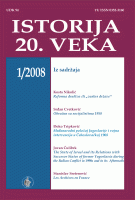ARAPSKO-IZRAELSKI RAT 1967. GODINEI JUGOSLOVENSKO-AMERIČKI ODNOSI
ARAB-ISRAELI WAR OF 1967 AND YUGOSLAV RELATIONS WITH UNITED STATES
Author(s): Dragan BogetićSubject(s): History
Published by: Institut za savremenu istoriju, Beograd
Keywords: Yugoslavia; USA; Arab-Israeli war; economical and political cooperation;
Summary/Abstract: The attempts of Yugoslav officials to step in as important protagonists in the resolution of the crisis in the Middle East significantly affected the currents of relations between Yugoslavia and the Unites States. Although the contacts between these two sides intensified visibly, mutual animosities and suspicions grew as well. Giving an unreserved support to the Arab countries, Yugoslavia was organizing a sharp political campaign, directed not only against the Tel Aviv regime, but also against policies of the US. At the same time, Yugoslavia was aligning more closely to the socialist states in a way unprecedented since 1948. The awareness that this strengthening of the prestige of Yugoslavia in the non-aligned world has damaged its preceding balanced policy towards blocks caused a temporary toning down of the anti-American campaign in Belgrade, as well as the launch of frequent diplomatic initiatives aimed to negotiate between USA and both USSR and the Arab countries, in order to achieve mutually acceptable solution. American president Johnson acknowledged those initiatives with great attention, bearing in mind the reputation of Yugoslavia in Arab countries, but also the significant influence it might exercise upon Soviet Union in the context of the crisis. Johnson had even written to Tito, who wrote back. Tito has to some extent succeeded to fulfill the expectation of Washington. He convinced Arabs to drop their revanchist plans and acknowledge the integrity of Israel. The general failure to find a peaceful solution for the Middle-Eastern crisis had a negative impact on the relations between Yugoslavia and USA during 1967 and in the following period. The support to different sides in conflict was a permanent source of crisis in those relations and generated their confrontation in the UN. However, the undisputed interest of both sides in the maintenance of basic economical and political cooperation has prevented the factors of their conflict from overcoming the factors of their cooperation.
Journal: Istorija 20. veka
- Issue Year: 2008
- Issue No: 1
- Page Range: 101-115
- Page Count: 14
- Language: Serbian

